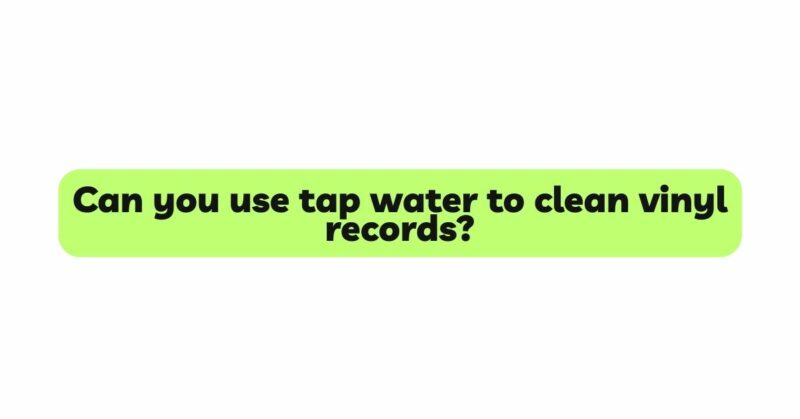Proper maintenance and cleaning are crucial to preserving the sound quality and lifespan of vinyl records. Audiophiles and collectors are often on the lookout for safe and cost-effective cleaning methods to ensure their cherished vinyl collections remain in optimal condition. One common question that arises is whether tap water can be used to clean vinyl records. Tap water is readily available and seemingly harmless, but its use on vinyl records raises concerns about potential damage. In this article, we will explore the pros and cons of using tap water for vinyl record cleaning and provide insights into safer alternatives for maintaining these valuable analog treasures.
Understanding the Vulnerabilities of Vinyl Records:
Vinyl records are made of polyvinyl chloride (PVC), a type of plastic that is susceptible to scratches, warping, and degradation if not handled and cleaned with care. The grooves on the record’s surface contain the audio information, and any damage to these grooves can result in audible noise, distortion, and a significant loss of sound quality. Therefore, it is essential to be cautious about the cleaning agents and techniques used to maintain vinyl records.
The Pros of Using Tap Water for Vinyl Record Cleaning:
- Cost-Effectiveness:
Tap water is a cost-effective and easily accessible cleaning option, as it requires no additional expense. It is readily available in most households, making it a convenient choice for those who might not have access to specialized vinyl cleaning solutions.
- Mild Cleaning Agent:
In its natural state, tap water is relatively mild and free from harsh chemicals, making it appear safer than some commercial cleaning products. When used correctly, tap water can help remove surface-level dust and dirt from vinyl records without causing immediate harm.
- Non-Abrasive:
Tap water is non-abrasive, which reduces the risk of causing physical damage to the vinyl’s surface. Unlike some household cleaning products, water does not contain abrasive particles that could scratch or mar the record.
The Cons and Risks of Using Tap Water for Vinyl Record Cleaning:
- Mineral Content and Impurities:
One of the primary concerns with tap water is its mineral content and potential impurities. Depending on the location, tap water can contain minerals like calcium, magnesium, and other impurities that may leave deposits on the record’s surface during cleaning. These deposits can affect the vinyl’s sound quality and lead to a buildup of residue over time.
- Risk of Water Stains and Warping:
Excessive use of water or improper drying techniques can lead to water stains or warping of the vinyl record. Water stains can cause discoloration and cloudiness on the record’s surface, while warping can result in audible distortion during playback.
- Interaction with Labels and Sleeves:
Using tap water to clean vinyl records can also pose a risk to the record’s label and outer sleeve. If water comes into contact with the label or sleeve, it can cause ink to bleed, paper to warp, or even lead to mold growth.
- Limited Cleaning Efficacy:
While tap water can help remove surface dust and dirt, it may not effectively clean deep-seated contaminants within the grooves. For thorough cleaning, specialized vinyl cleaning solutions or record cleaning machines are recommended.
- Hard Water Issues:
In areas with hard water (water containing a high concentration of minerals), tap water can pose a greater risk to vinyl records. The minerals in hard water can leave behind residue on the vinyl, affecting sound quality and causing visible marks on the record.
Safer Alternatives for Vinyl Record Cleaning:
- Distilled Water:
Distilled water is a safer alternative to tap water for vinyl record cleaning. Distillation removes impurities and minerals from the water, reducing the risk of leaving deposits on the record’s surface.
- Record Cleaning Solutions:
Specialized vinyl record cleaning solutions are designed to clean records effectively without causing damage. Look for alcohol-free solutions with a neutral pH level to ensure the safety of your records.
- Record Cleaning Machines:
Investing in a reputable record cleaning machine is an efficient and effective way to clean vinyl records. These machines use vacuum suction and cleaning solutions to remove dirt and contaminants from the grooves without risking damage.
- Anti-Static Brushes and Cloths:
Anti-static brushes and microfiber cloths are safe and gentle tools for removing surface dust from vinyl records. They help prevent static buildup and avoid potential scratches.
Conclusion:
In conclusion, while tap water might seem like a convenient and cost-effective solution for cleaning vinyl records, it comes with potential risks and drawbacks. The mineral content and impurities in tap water can lead to residue buildup, water stains, and warping of vinyl records over time. To ensure the longevity and optimal sound quality of your cherished vinyl collection, consider safer alternatives such as distilled water, specialized vinyl cleaning solutions, record cleaning machines, anti-static brushes, and microfiber cloths. By adopting proper cleaning practices and avoiding potential risks, you can maintain your vinyl records in pristine condition for years to come.


